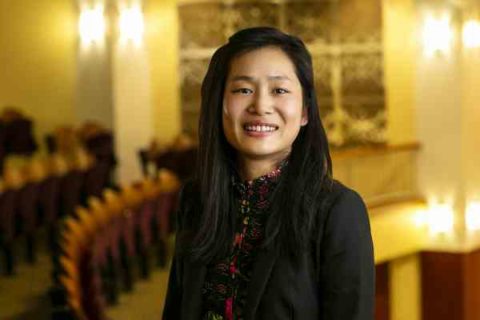For this month’s faculty feature, student navigator Emory Freeman had the pleasure of interviewing violinist Iris Wei. An active educator, Iris Wei maintains a violin studio of over forty students ages ranging from 3 to 18, teaches group classes, and coaches chamber music and sectionals in Merit School of Music’s Conservatory. Ms. Wei believes in building people; her greatest source of pride comes from guiding her students to become happy and healthy human beings – high-level musicians who are kind, know how to deal with adversity, and excel at whatever endeavors they pursue.
 In her pedagogical training, Ms. Wei has had the privilege of learning from Michele George, Ed Kreitman, Nancy Jackson, Ann Montzka-Smelser, and Tom Wermuth. As a performer, she has performed with groups such as the Northwest Indiana Symphony Orchestra, New Philharmonic, Rockford Symphony, and the Civic Orchestra of Chicago. Also a pianist, Ms. Wei switched her main focus to violin after being accepted as a scholarship student at Roosevelt University’s College of Performing Arts in Chicago, Illinois, where she completed her Bachelor’s Degree in Performance. Aside from making music and teaching, she is an avid runner, eater, and dog lover.
In her pedagogical training, Ms. Wei has had the privilege of learning from Michele George, Ed Kreitman, Nancy Jackson, Ann Montzka-Smelser, and Tom Wermuth. As a performer, she has performed with groups such as the Northwest Indiana Symphony Orchestra, New Philharmonic, Rockford Symphony, and the Civic Orchestra of Chicago. Also a pianist, Ms. Wei switched her main focus to violin after being accepted as a scholarship student at Roosevelt University’s College of Performing Arts in Chicago, Illinois, where she completed her Bachelor’s Degree in Performance. Aside from making music and teaching, she is an avid runner, eater, and dog lover.
How did you get started with CMPI?
James Hall reached out to me, and I wanted to be a part of it. At the time, I knew a little bit about CMPI because they were housed at Merit. We knew that there would be a few students at Merit who could participate in CMPI. I had an interest in it already because we have a similar mission at Merit, and our goals are aligned with CMPI.
What have been the benefits of the advisory process at CMPI?
It has been good for my students in the sense that it gives extra motivation and opens up a different world to them. Fellows are brought in from all across the city who play better than each other, and the fellows realize that they are no longer big fish in a small pond. Some of my students mentioned that the jury and advisory process have gotten me through the pandemic. The whole process including rehearsing with a pianist gives the student a more competitive environment with the added inspiration of seeing other fellows who look like themselves. The fellows also have the chance to meet new people and widen their network.
Did you have a program like CMPI when you were younger?
Oh my gosh! It was nothing close to what they are doing. The piano was my main instrument, and the violin was secondary to my piano studies. I enjoyed being in an orchestra, but I never thought of it competitively. If I had something like CMPI when I was younger, then my world would have been completely different. The fellows have access to world-class musicians, teachers, and other various resources. I did not have the same resources through a program like CMPI when I was younger. The CMPI fellows are exposed to so many things that I did not get exposure to when I was their age.
What are some teaching highlights you have with teaching CMPI fellows?
Connecting with the mentees is something that I look forward to. As a teacher, we see people on a weekly basis, and it is easier to connect. With the fellows, sometimes we discuss things that are not musical but affect the music-making. I give them advice knowing that making a connection with the CMPI fellows is rewarding and fulfilling for me. Another highlight is when one of my students acquired a new bow with the help of CMPI. They were able to do so much more, and as a teacher, it was exciting to witness.
What are some words of encouragement you have for our CMPI students?
Take advantage of the resources you are given. When I was younger, I had to drive two hours just to go see my home symphony perform. The CMPI fellows are given so many resources and it is a wonderful opportunity. Another piece of advice would be to keep going. Everyone is going through so many struggles and obstacles, but the key is no matter what happens, find a way to keep playing. Sometimes students have an idea that everything will be simple and smooth. Without challenges, it would not be an exciting journey. Embrace the difficulties and do not always look at something as a hurdle.
Images
Iris Wei
